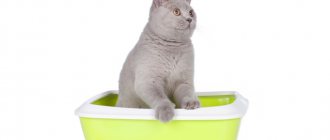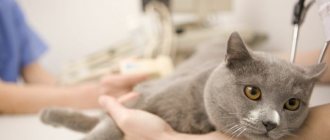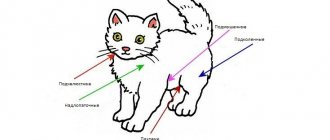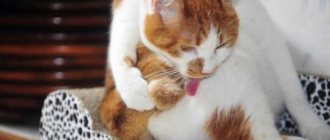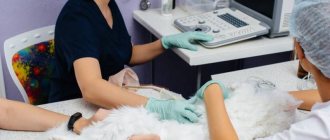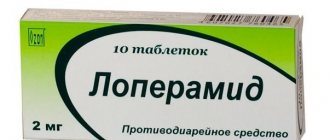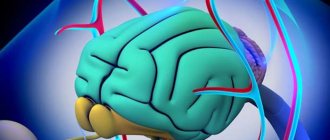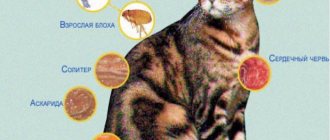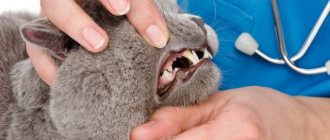One of the most common diseases of the digestive system in cats is colitis. Its development can be triggered by various factors, but the main thing is to provide timely assistance to the pet in order to avoid the development of serious consequences. To learn how to determine colitis in a cat and whether this disease can be treated, see below.
Read in this article:
Colitis - what is it? Forms of the disease: how does it occur in cats? Causes of colitis in cats Signs of inflammation Complications – why is the disease dangerous? How to determine colitis? Prognosis Treatment of colitis in cats Diet for inflammation of the large intestine Prevention of colitis: recommendations from a veterinarian
Forms of the disease: how does it occur in cats?
Acute colitis . Most often it is provoked by poor-quality food or a sharp change in diet (for example, a transition from natural food to industrial food). Symptoms of acute colitis increase very quickly - within 2-3 hours. There are bouts of vomiting, loss of appetite or complete refusal to eat, and a lethargic and painful state of the pet.
Chronic colitis . Often the causes of chronic colitis cannot be determined. Such an inflammatory process, the symptoms of which develop over a long period of time (for example, several days or even weeks), is called idiopathic. Treatment for chronic colitis usually includes a special diet high in fiber. The disease itself is long-lasting and difficult to treat.
Laryngophangeal reflux and GERD
Although stomach acid is common to both LPR and GERD, many differences exist, making LPR a distinct clinical entity.
- A prerequisite for GERD is heartburn, which is reliably observed only in 40% of patients with LPR.
- Most patients with GERD have evidence of esophagitis on biopsy, while patients with LPR have evidence of esophagitis in only 25% of cases.
- GERD is thought to be a problem of the lower esophageal sphincter and occurs primarily when lying down. In contrast, LPR is seen primarily as a problem of the upper esophageal sphincter, and occurs primarily in an upright position during exercise.
- To form LPR, much less acid exposure is required than with GERD.
There are significant differences between the mucous membrane of the esophagus and larynx.
- The upper limit of normal for acid reflux into the esophagus is considered to be up to 50 episodes per day, while 4 episodes of reflux into the larynx is no longer considered normal.
- In the larynx, unlike the esophagus, which eliminates acid through peristalsis, refluxate persists much longer, causing additional irritation.
- The epithelium of the larynx is thin and poorly adapted to combat caustic chemical damage from the same pepsin and acid.
Causes of colitis in cats
The most common cause of colitis in cats is poor quality nutrition. Expired foods, foods from the human table (for example, smoked sausages, sausages, pates, fried, salty or spicy foods) - all this can lead to disruption of the functioning of the digestive system and the development of colitis.
Frequent overeating or lack of a balanced diet in combination with low-quality products can also provoke the development of pathogenic bacterial microflora in the cat’s body, nausea and vomiting, as well as an inflammatory process - colitis.
Other factors that trigger the development of ulcerative colitis in cats include:
- drinking raw water
- taking prohibited foods (for example, baked goods),
- invasive (parasitic) diseases,
- problems with metabolism in the animal’s body,
- dysbacteriosis (disturbance of microflora),
- damage to the intestinal walls (for example, from swallowing small foreign objects or bones).
Another reason that can lead to the development of colitis in pets is stress. They may be associated with a change in place of residence or the appearance of another pet in the house (for example, another cat).
The principle of pathology development
Once in the stomach, irritants act on the mucous membrane, causing inflammation and disruption of secretory function. Digestive juice becomes abundant or its production stops.
Against this background, normal digestion of the food coma will be impossible; vitamins, minerals and other components are not absorbed in the gastrointestinal tract. There is a decrease in body weight, weakness, and intestinal upset. Prolonged exposure to the provoking factor and lack of treatment leads to ulceration of the mucous membrane and bleeding.
Pylorospasm begins (a change in the functioning of the pylorus), the vomiting center is involved in the pathological process, so cats with gastritis may experience periodic vomiting and belching. Vomiting foam or bile in the morning is the main sign of gastritis.
The longer the animal owner ignores going to the doctor, the more deeply other organs involved in the digestive process are affected. Inhibition of the motor function of the stomach leads to disruption of the evacuation and digestion of food, it stagnates in the intestines, begins to decompose, and general intoxication develops.
Cats are characterized by triaditis - simultaneous inflammation of the pancreas, duodenum and hepatic ducts.
Signs of inflammation
The first thing that indicates the development of colitis in a cat is acute and frequent diarrhea. Blood clots and mucus are present in the stool. Some cats experience pain during defecation, so they meow loudly. In some cases, animals try to stop defecating, which only provokes the development of constipation.
Other symptoms of colitis in cats:
- loss of appetite,
- bouts of vomiting,
- lethargic state
- apathy,
- weakness,
- refusal to play,
- plaintive meow,
- lack of response to any calls,
- pain when palpating the abdominal area.
With colitis, the condition of cats worsens sharply. In advanced cases, body temperature rises (we remind you that in normal conditions it is 38-39 °C), and the mucous membranes acquire a violet-bluish color. In acute colitis, if you do not contact a veterinarian in a timely manner, severe convulsions are possible.
First aid at home: how to relieve pain from an attack
A very important rule for providing first aid at home is not to administer painkillers to relieve spastic attacks unless prescribed by a specialist.
- You can numb the attack while waiting for a specialist to arrive by gently massaging your abdomen and applying a heating pad with ice to the sore spot.
- It is allowed to use adsorbent and carminative drugs when administered orally.
- If the condition is critical, the cat screams in pain, there is vomiting and diarrhea with blood, you must immediately inform a specialist about this, you can even by phone. Most often, in such a situation, the doctor recommends an injection of an anesthetic drug to avoid painful shock.
Complications – why is the disease dangerous?
If you do not respond to changes in your pet’s condition and do not seek veterinary help, colitis can lead to serious consequences - intoxication of the cat’s body. Toxins affect the functioning of all internal organs, including the liver and kidneys. The functioning of the gastrointestinal tract is disrupted, the pet completely refuses to eat, and the absorption of vitamins and nutrients worsens. All this leads to exhaustion, dehydration, and in severe cases, death.
To prevent complications, contact a veterinary clinic in a timely manner - doctors will examine your pet and prescribe effective treatment to fully restore the animal’s body!
What is irritable bowel syndrome?
This is a disorder of the intestines and discomfort in the abdomen during bowel movements. The syndrome itself is not a disease, but rather a set of symptoms that often occur for an unknown reason. Unfortunately, such a disorder can significantly reduce a person’s quality of life, forcing him to remain in an uncomfortable state: digestion is disrupted, metabolic processes in the body worsen, and the saturation of the human body with nutrients decreases.
Irritable bowel syndrome is a very common occurrence among people aged 25 to 40 years. Statistics show that at least once in their life, every third person has experienced the unpleasant symptoms of irritable bowel syndrome.
Self-medication in this case can be very dangerous to health. The fact is that the syndrome is treated comprehensively and under the close attention of the attending physician. The consequence of self-medication can be intestinal obstruction and numerous chronic gastrointestinal diseases. With the first signs of irritable bowel syndrome, you should contact a therapist, who will refer you to a more specialized specialist - a gastroenterologist. The diagnosis is usually made only after excluding tumors and inflammatory changes in the intestines.
The intestines are where food is digested and nutrients are obtained by the body. When food enters the intestines, it moves along the intestines. This process of advancement is achieved through the work of smooth muscle cells within the intestinal walls. The cells alternately contract and relax. But when IBS (irritable bowel syndrome) appears, cell function is disrupted. Food begins to pass through the intestines either too quickly or too slowly. The result is discomfort and constipation or diarrhea.
How to determine colitis?
Only a veterinarian can make an accurate diagnosis. If you notice signs of inflammation or other changes in your cat's behavior, take her to a veterinary clinic immediately. We strongly do not recommend doing treatment yourself - this can lead to serious and irreversible consequences for the animal’s health.
To make an accurate diagnosis, the veterinarian palpates the abdominal area, interviews the cat’s owner, and also prescribes tests:
- Ultrasound of the abdominal cavity,
- stool analysis,
- general and clinical blood tests,
- biopsy,
- endoscopic examination of the large intestine.
The veterinarian not only makes a diagnosis, but also prescribes treatment taking into account the characteristics of the pet’s condition.
Intestinal parasites
Quite common in kittens. Roundworms and hookworms are the most common intestinal parasites and many kittens become infected with these worms soon after birth, either through the mother's milk or through contact with a contaminated environment. Other parasites such as tapeworms, coccidia and giardia may also be seen. To diagnose intestinal parasites, your veterinarian will examine a sample of your kitten's stool under a microscope and then prescribe a treatment regimen based on the type of parasite.
Treatment of colitis in cats
On the one hand, treatment of colitis is aimed at eliminating the cause that provoked the development of the disease (for example, helminths), and on the other, at restoring the animal’s digestive system. Various methods are used for this, including drug therapy and diet.
Drug therapy involves the use of various drugs (probiotics, anti-inflammatory and antimicrobial agents). Additionally, medications are prescribed that affect intestinal motility and restore its normal functioning.
Most often, treatment is carried out on an outpatient basis. If necessary, additional methods are used, one of which is anthelmintic treatment of the animal or surgery (prescribed if elimination of ulcerative colitis is required).
Additional treatment methods also include infusion therapy (drip), prescribed for severe dehydration, as well as taking antihistamines if inflammation of the large intestine is caused by an allergic reaction.
Diet for inflammation of the large intestine
For exacerbations of colitis and frequent relapses, it is recommended to use special dietary foods designed to correct digestion. They are available in different brands, but it is best to consult a veterinarian before purchasing. He will tell you which food is best suited in this case.
On a note! If colitis is caused by allergic reactions of the body, then choose hypoallergenic food.
A diet for colitis requires a mandatory refusal of all foods “forbidden” for cats:
- sweet, salty, pickled and fried foods,
- bones,
- nuts,
- legumes,
- liver,
- pork and lamb,
- mushrooms,
- sausages,
- sausages, etc.
Prevention of colitis: recommendations from a veterinarian
The most effective way of prevention is proper nutrition. When creating a diet, use only high quality feed with a balanced composition. If possible, consult a veterinarian - he will tell you what diet you should follow.
Make sure your animal always has access to fresh and clean water. Give him only boiled or at least filtered water - it is better to avoid raw water from the tap. Teach your cat to eat only at home and do not give anything from your table.
Other recommendations to help prevent your cat from developing colitis or other diseases of the digestive system:
- carry out deworming in a timely manner;
- Vaccinate your cat annually;
- adhere to a proper and balanced diet;
- make sure that the cat does not pick up anything from the floor or ground (small parts, threads, bones, etc.);
- take care of the absence of stress in the life of your furry pet;
- Pay attention to any changes in his health.
And most importantly, attend regular checkups at the veterinary clinic!
